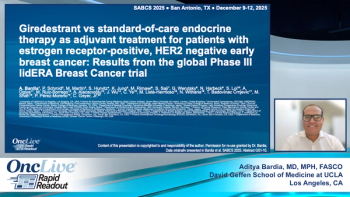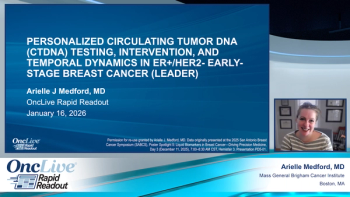
|Videos|February 9, 2022
Rapid Readouts: Results of Phase 3 DREAMseq Trial in Advanced Melanoma
Author(s)Michael B. Atkins, MD
Michael Atkins, MD, shares data presented at the 2021 American Society of Clinical Oncology Plenary Series regarding results from the phase 3 ECOG-ACRIN EA6134 trial, DREAMseq, evaluating the use of up-front dual immunotherapy in patients with BRAF V600–mutant advanced melanoma.
Advertisement
Michael B. Atkins, MD,discusses data from the following poster: “DREAMseq (Doublet, Randomized Evaluation in Advanced Melanoma Sequencing): a phase III trial—ECOG-ACRIN EA6134.” (
Introduction
- Combinations of immune checkpoint inhibitors blocking PD-1 and CTLA4 or BRAF/MEK inhibitors have shown significant antitumor efficacy and overall survival (OS) benefit in patients with BRAF V600–mutant metastatic melanoma, leading to broad regulatory approval.
- The objective of this presentation was to provide the results of the phase 3, DREAMseq trial, designed to compare the efficacy and toxicity of nivolumab-ipilimumab followed by dabrafenib-trametinib with the converse sequence.
Methods
- Eligible patients with treatment-naïve BRAF V600–mutant metastatic melanoma were stratified by ECOG performance status 0 or 1 and lactate dehydrogenase level and randomized 1:1 to receive step 1 with either nivolumab-ipilimumab (Arm A) or dabrafenib-trametinib (Arm B).
- At disease progression, patients were enrolled in step 2, receiving the alternative therapy, dabrafenib-trametinib (Arm C) or nivolumab-ipilimumab (Arm D), respectively.
- Patients received 4 doses of nivolumab (1 mg/kg)–ipilimumab (3 mg/kg) every 3 weeks, followed by nivolumab 240 mg intravenously once every 2 weeks for up to 72 weeks (Arms A and D) or dabrafenib 150 mg orally twice daily and trametinib 2 mg orally once daily until disease progression (Arms B and C).
- The primary end point was 2-year OS
Results
- The overall grade 3+ toxicity was 60% in Arm A and 52% in Arm B. Grade 5 treatment-related adverse events included 2 on Arm A and 1 on Arm C.
- The objective response rate to date is: Arm A, 46% (52/113); Arm B, 43% (49/114), Arm C, 48% (11/23); and Arm D, 30% (8/27). 37/42 assessed patients in Arm A and 19/37 in Arm B remain in response.
- The median duration of response (DOR) for Arm A was not reached, and for Arm B it was 12.7 months (95% CI: 8.2, -) (P < .001). There were 100 deaths (Arm A to C, 38; Arm B to D, 62).
- The 2-year OS rate for those starting with Arm A was 72% (95% CI: 62%-81%), and for Arm B it was 52% (95% CI: 42%-62%) (log-rank P = .0095).
- The progression-free survival (PFS) showed a trend in favor of Arm A (log-rank P = .054). Both the PFS and OS curves show a biphasic pattern, with Arm B being above Arm A until 6 and 10 months, respectively.
Conclusion
- For patients with advanced BRAF V600–mutant metastatic melanoma, the treatment sequence beginning with the immune checkpoint inhibitor combination of nivolumab-ipilimumab resulted in superior overall survival, which became evident at 10 months, with longer step 1 DOR and more ongoing responses than the treatment sequence beginning with dabrafenib-trametinib.
Advertisement
Latest CME
Advertisement
Advertisement
Trending on OncLive
1
Single-Center, Retrospective Data Show Low Rate of Lifileucel Infusion Following Referral in Advanced Melanoma
2
Real-World Data Support Clinical Benefit With Lifileucel in Previously Treated Advanced Melanoma
3
Long-Term Cilta-Cel Data Show Low Rates of PFS Events in Standard-Risk R/R Myeloma
4
Dr Riedell on the Long-Term Efficacy of Tisa-Cel in R/R Follicular Lymphoma
5






































